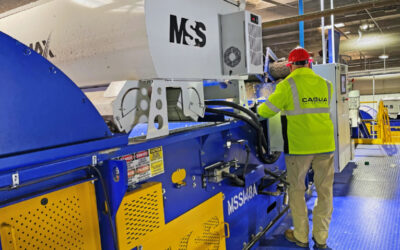Hightowers Petroleum Company (HPC) has a presence in every state and is currently the largest African-American-owned downstream petroleum wholesale marketer operating in the U.S. This family-owned business sells gasoline and diesel to automotive OEMs (Original Equipment Manufacturers), grocery chains, the steel industry, utilities and other Fortune 500 companies, and it takes pride in its comprehensive service.
“We deliver a load of fuel probably every five minutes, seven days a week, twenty-four hours a day,” states President, Chief Executive Officer and Owner Steve Hightower.
The Middletown, Ohio-based firm offers a ‘Fuel Doctor’ program which consists of preventative maintenance and inspection of fuel storage tanks, emergency fuel delivery in case a power grid goes down, and a service called “mobile refueling, where we actually go in at night and fill trucks and vehicles on site,” continues Hightower. It also provides a popular HPC MasterCard™ Fleet Card that can be used for a broad range of merchandise and services at over 10,000 truck stops and 200,000 gas stations, and it sells fuel additives, but wholesale gas and diesel sales remain the foundation of everything the company does.
Coming from a highly entrepreneurial family, Hightower also engages with other businesses, is involved in several community, industry and political organizations, and is actively looking at new markets for HPC. At present, the company has offices in New York City; Washington, D.C.; Baltimore; Miami; Los Angeles; and Michigan. HPC also does business in Canada, Mexico, and South Africa.
“Our client base is quite broad and spread across many market sectors, which is a benefit of [selling] a commodity like petroleum, where you have various industry sectors that utilize fuel,” says Hightower. The company counts General Motors, FedEx, Kroger, Delta, Nissan, Duke Energy, and ATT as clients.
Providing fuel for automotive OEMs is one of the company’s specialties. “If you look at the automotive industry, which is a very a large side of our business, we do all the initial fuel for all GM and Nissan plants throughout North America, including Mexico,” he notes, adding that cars right off the assembly line “get fuel that’s provided by Hightowers Petroleum Company.”
The family has operated businesses since the 1950s when Steve’s father Yudell Hightower founded Hightowers Janitorial Service. This firm grew to a couple of hundred employees at its peak. In 1979, Steve struck out on his own, founding Hi-Mark Construction Group. The company, which still exists today, specializes in construction work on commercial and institutional buildings and wastewater plants. In 1981, he bought Hightowers Janitorial Service from his father, selling the company a couple of years later. He also began exploring the fuel delivery business.
He did not know much about fuel sales, but with a business and communications degree from Wright State University in Ohio and experience working for the family janitorial company, he was ambitious and eager to learn. “I was not knowledgeable about the petroleum business at all. Through osmosis and business savvy over the years, I learned [the trade],” he recalls.
Things were slow at first. Hightowers Petroleum Company, which briefly operated under a different name, consisted of two people in the very early days. “We built the business one customer at a time and held on to our customers. We held onto our supplier relationships and built from there. The first customer I had, in 1981, I still do business with them. The first supplier I had in 1981, we still do business as well,” he says.
Hightowers Petroleum Company was incorporated in 1984 and now has roughly sixty-five employees, and the company regards them as family. “We operate on a basis where we try to treat our employees with respect,” he adds. “The things we want for our family, our associates want the same for their family as well.”
When contemplating new hires, the company values character. “We look for energy, number one. We look for integrity, number two, and we also look for background and experience in the category in which we’re asking you to come on board and work with our organization. You’ve got to have some level of chemistry, not be disruptive, and can meet the core values of our organization: being willing to work hard and give it all you got,” explains Hightower.
HPC has become a licensed motor fuel dealer in South Africa and continues to look for new markets and opportunities. “There is a different market sector we’re looking to expand into, and that is the upstream. We’re now providing crude oil to refiners, and we are pursuing LNG – liquefied natural gas. We first began to pursue crude oil in 1983, and it took until 2019 to get our first crude contract and solidify our growth plan for the future,” he says.
At the same time, the company remains focused on its defining service, which is selling fuel. “Our business is being a marketer of refined products. There are various other aspects of the industry, such as refining, or production – which could involve fracking and drilling – that we are not involved with. We do not have the expertise, and we are not looking at going into those sectors of the business any time soon,” he explains.
As a leading marketeer in the wholesale petroleum sector, HPC recently became involved with SmartWay, an initiative run by the Environmental Protection Agency (EPA) to encourage fuel efficiency and reduce emissions in freight transportation.
Hightower says the company’s involvement is a reflection of its beliefs: “We have the ability to be a leader in terms of looking for ways to be more environmentally friendly. SmartWay was [a program] we choose to work within that category, with our carriers,” he states.
HPC also sells eco-friendly products such as diesel exhaust fluid (DEF) – a liquid that controls diesel emissions – and fuel additives required on trucks by the EPA. Hightower also operates a business called HP Energy, a self-described ‘energy efficiency project development and project management firm’ that is focused on turnkey energy projects. Among other activities, HP Energy examines energy efficient technologies and alternative energy sources such as solar and hydrogen fuel cells and Smart Cities.
The company first obtained an ISO status in 2002, in part because of work it was doing for automotive clients. HPC is ISO 9001:2015 and ISO 14001:2015 certified for quality and environmental management, respectively.
Having an international quality standard was a requirement in the automotive sector and “something we adopted very early,” explains Hightower. Today, quality has become “part of our DNA,” and the company even “passes our quality standards to our carriers, as well as our suppliers.”
This emphasis on quality has not gone unnoticed. HPC this year has been awarded supplier of the year awards from the likes of General Motors and Duke Energy. “Any time you get that type of recognition, understanding the thousands of suppliers [those companies] have in their supply chain, you stand out as being one of their top performers. It’s always an honor and something that keeps us humble, keeps our nose to the grindstone. We always want to do better than we did yesterday,” says Hightower.
In addition to running several businesses, he somehow finds time to be involved with multiple organizations. These include the Cincinnati USA Regional Chamber of Commerce, the U.S. Chamber, the U.S. Black Chamber, the CBCI 21st Century Council, National Black Caucus of State Legislators Corporate Round table, National Minority Supplier Diversity Council Board of Directors, American Association of Blacks in Energy, Chair of the Entrepreneur committee and others. He explains that part of his “exponential marketing strategy is to become part of the fabric of such organizations so that the HPC company name is on the tip of everyone’s tongue,” he explains, adding that, “it also makes good sense to stay abreast of legislation that might affect the company and our industry.”
Challenges facing HPC include “trying to grow into the level of organization we want to be,” – a process that involves money, says Hightower. “We’re looking at how we can hopefully remain a privately-held company and attract the dollars we need for our growth. To excel in the crude oil markets and the LNG markets require capital, large amounts of capital.”
He has personal and professional plans for the future. In five years, he’d like to see the company transformed into “both an upstream and downstream company,” he says. “At that point in time, I’ll probably start looking at an exit for myself – turning it over to the next generation.” That next generation being younger members of the Hightower family. At present, his son, Stephen Hightower II, works as the Chief Operating Officer of HPC with a daughter in supply and bids and a nephew as the Chief Technology Officer. Another son runs the construction division.
Hightower says he strongly supports efforts to include more minorities, women, and veterans in the petroleum supply industry. He also wants people to judge Hightowers Petroleum Company strictly on its own merits, not because of his ethnicity.
“Many times people want to look at us as a minority company, and I challenge them not to just look at our designation as a minority company but look at our place in the marketplace as a downstream petroleum company doing business competitively every day against [other] petroleum companies in the industry,” says Hightower. “I think that’s the one legacy I want to be able to leave: that we have been able to be the best in the industry period and not the best minority company in the industry.”












